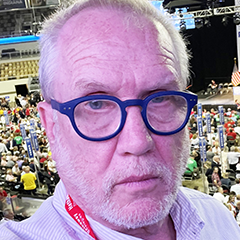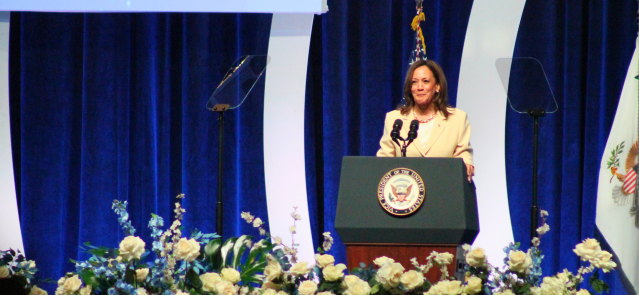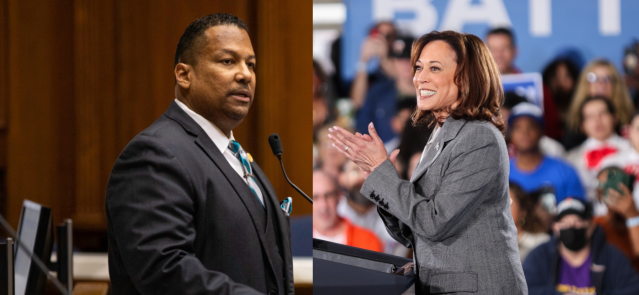Stay ahead of the curve as a political insider with deep policy analysis, daily briefings and policy-shaping tools.
Request a DemoSuzanne Crouch positions herself as a ‘different’ candidate for the voiceless
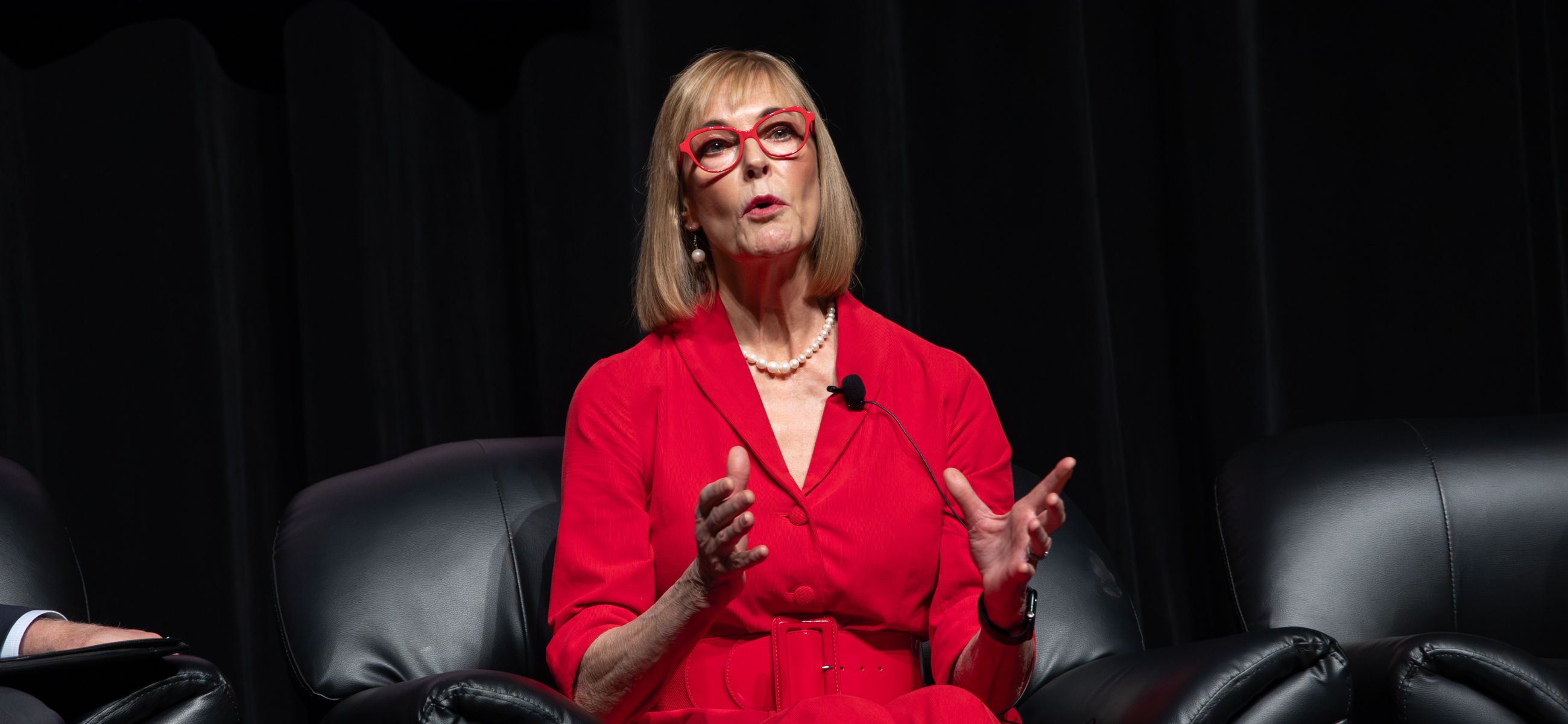
Lt. Gov. Suzanne Crouch participates in the gubernatorial candidates panel at Dentons Legislative Conference. (Credit: Mark Curry)
EDITOR’S NOTE: This is one in a series of profiles of the candidates running for Indiana governor.
CARMEL — At one of the first homestretch debates in early March, most of the six-person Republican gubernatorial field prepared to pick a fight with Gov. Eric Holcomb’s handling of the COVID-19 pandemic. The candidates’ criticism of shutdowns and mandates bled over to Lt. Gov. Suzanne Crouch.
“People are served best when there is a balance of power between the judicial, executive and legislative branches. During COVID, that balance of power was disrupted,” Crouch responded as her five opponents looked on. “It is why I supported so strongly Senate Bill 234, which limits the governor’s abilities to extend emergency powers.”
She quickly pivoted, asking, “Where was everybody when FSSA made a billion-dollar mistake? And parents with severely disabled, complex medical needs children were not able … to continue to care for their children in their homes?
“I asked for a pause,” Crouch said of the Family Social Services Administration’s attendant care program that created a significant portion of the cost overrun last year. “I asked for an independent audit. Those are the Hoosiers I will be a voice for.”
For the lieutenant governor from Evansville, whose career has coursed from being Vanderburgh County Republican chair to a county commissioner, a state legislator, state auditor and then second in command, much of her campaign has been about being that “voice” for the poor, the disabled, the homeless, the addicted.
It was rare for a lieutenant governor to level criticism at her boss, who is officially neutral but not inclined to endorse his political partner of seven years. “He’s the governor and he’s performing his duties and I’m performing my duties as chair of the IDD [Intellectual and Developmental Disabilities] Task Force,” Crouch said in February when she called for an independent audit. “It is my duty to speak out on behalf of the people who don’t have voices. And they don’t have high-paid lobbyists. They have only people like me and the other members of the task force to speak out and draw attention to this issue.”
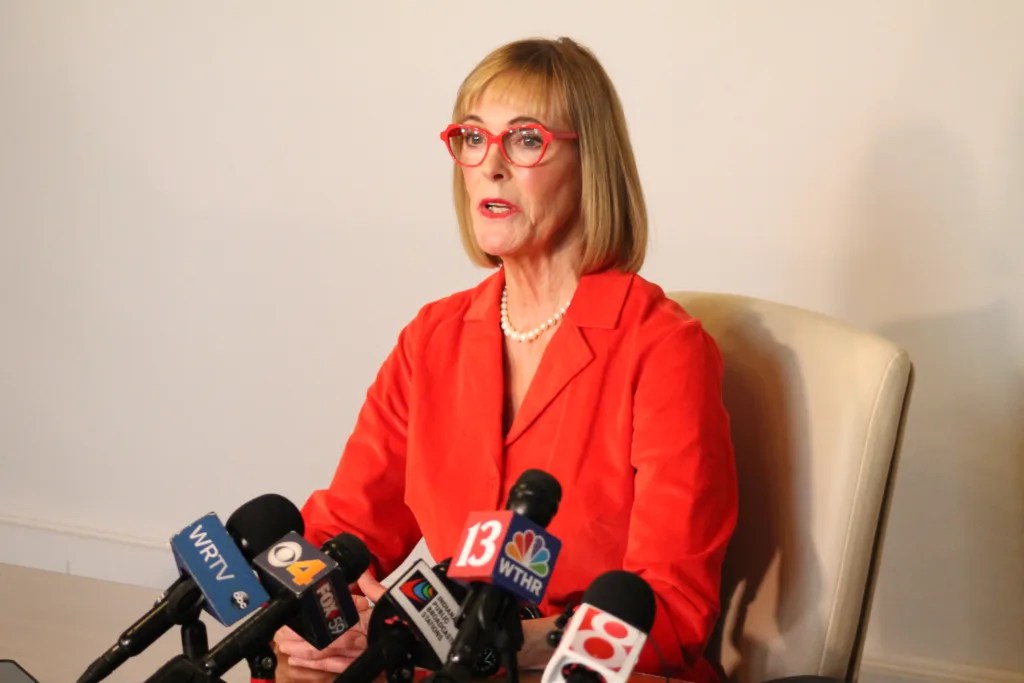
As for future pandemic restrictions, Crouch overtly backed legislation curtailing the governor’s emergency powers. “Senate Bill 234, limiting executive powers in an emergency, has my full support,” Crouch said. “As governor, I will work with legislators to ensure the voices of their constituents are heard in any prolonged emergency situation in Indiana. Hoosiers have a right to know if their rights are being curtailed unnecessarily.”
Collaborative roots
Crouch notes that the Evansville area is known for collaboration. “We have one 911 system, one central dispatch, one library, one school corporation,” she said of Indiana’s third-largest city and Vanderburgh County. “When I was in local government, there were 13 interlocal agreements with the county and city on how they operated. It is a unique county in that way.”
Former three-term Republican Evansville Mayor Lloyd Winnecke, an unabashed Crouch supporter and friend for more than 40 years, calls the region’s collaborative nature “our secret sauce.”
“I know there is collaboration everywhere, but it’s so natural here because of deep personal relationships,” Winnecke told Howey Politics Indiana in December 2022. “That’s the foundation of every piece of collaboration. Even if there is a slight disagreement of direction, it all gets worked out. For the medical school to be there, so many things had to happen. We had to acquire the property, we had to do all the infrastructure, the car dealership had to relocate before they could start building. It really was a matter of making phone calls and having meetings. It’s easy collaboration because of personal relationships.”
Robert Koch II, who helped establish the renowned charter Signature School in Evansville, has called Crouch a “stabilizing force.” As a legislator and vice chair of the House Ways and Means Committee, she brought Regional Cities funds to help establish the downtown medical school campus that combined the Indiana University School of Medicine, the University of Evansville, the University of Southern Indiana and Ivy Tech. “We wouldn’t be here in this building had it not been for her helping us on the Regional Cities with funds that helped us kick off this fund drive,” Koch explained to Howey Politics Indiana in 2022.
As governor, Crouch wants to bring this collaborative approach to state government.

“I know how government works, and I know what it works with,” Crouch told Howey Politics Indiana in 2022. “That is one of the strengths that I have, not just at the state level, but at the local level. So having that awareness, that understanding of how local government works and then being able to understand how state government works after being in the Legislature, being Ways and Means vice chair as well as on the Public Health Committee, then as auditor of state understanding the finances, being responsible for paying the employees and paying the bills, then as lieutenant governor overseeing four agencies and a number of initiatives … Indiana is in good shape.
“But we need to aspire to become great,” Crouch continued. “We can do it in a number of ways.”
Crouch then said, “Let me give you an example,” and launched into an analysis of how the state’s education purview is divided. “When it comes to education … early childhood education is housed in FSSA,” she began. “Then you have K-12, then you’ve got higher education and then you’ve got workforce training and DWD [Department of Workforce Development]; then you’ve got IEDC [Indiana Economic Development Corp.] and economic development.
“Why can’t we take early childhood education, K-12, higher education, pull out workforce training and then take a tiny bit of IEDC, so now we’ll have one agency where everyone is communicating, creating this cradle-to-career education system?” she asked. “Where every child is prepared for that next step, upon graduation, whether it’s open enrollment or apprenticeship?
“It makes perfect sense to start looking at our state government and figuring out how we can align, streamline and consolidate those agencies so we will realize efficiencies when we do that,” she said.
Crouch wants to change the dynamic between government and the people.
“We’ll make it easier for government to work for people,” she said. “People feel like they’re working for the government; they don’t feel the government is working for them. Maybe at the same time we should set up a navigator of state government. There would be a person you could call when you have a problem and get you connected to the right services. People aren’t calling government because they’re having a good day. They’re calling government because they have an issue or a problem and could use the help. And often they don’t even know where to turn.”
Dealing with inefficiencies
Crouch, who is secretary of agriculture and oversees the Office of Community Rural Affairs, also believes that rural taxpayers are not getting the same type of bang for the taxpayer buck that city constituents receive.
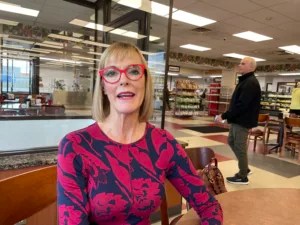
“We have to transform government,” she told Howey Politics Indiana in 2023, noting a recent study showing rural Indiana counties pay 35% more for services than urban and suburban areas. “We can streamline it, how we can consolidate functions and make it more usable for the public. No one will have a greater understanding of how government works and how government can work better for people, and government needs to work for people. If we focus on those building blocks, we will be able to enjoy the quality of life that will prompt people to not only visit Indiana, but will want to move to Indiana. We want to attract talent.
“I want to boldly lead Indiana into the future,” Crouch continued. “I have the passion, the commitment, the courage and the experience to do so. We’re going to focus on four building blocks: Building on Indiana, we’re going to grow our economy and improve our infrastructure; we’re going to invest in education; we’re going to strengthen our families and communities; and we’re going to reimagine state government. We’re going to take agencies and commissions and get them … more manageable — being able to streamline state government, taking functions and bring[ing] them together.”
‘Axe the Tax’
Crouch is battling in an unprecedented six-person primary. There were only a couple of candidates the last time there was an open seat in 2004.
“No party, Republican or Democrat, has held on to the governor’s office for more than 20 years since World War II,” Crouch told Howey Politics Indiana in October 2023 at Shapiro’s Deli in Indianapolis. “So in 2024, Republicans will have had it for 20 years. And we’re gonna hold on to it, but we need a different kind of candidate, and that’s where I come in. I’m running for governor because I want to boldly lead Indiana into the future, and I’m not going to spend four years learning in office and playing it safe, putting my finger in the wind so I can get reelected. I’m going to be bold and transformative. And I’m going to start by leading the fight to eliminate Indiana’s state income tax.”
Crouch’s “Axe the Tax” plan to gradually phase out the state income tax would allow Indiana to join the eight other states, including Florida, Texas and Tennessee, with no income tax. Critics say it would be impossible to replace $8 billion in revenue overnight — to which Crouch responds that they are missing her central point. “We’re not going to do it overnight,” she said at Shapiro’s Deli. “We can’t. It’s going to be phased in. It will be in place with triggers in case there’s an economic downturn.”
Crouch told HPI: “If we limit how much we allow government to grow and then we take excess revenue of the future and instead of putting it in government and spent by government, which is what we’ve always done, we take that and put it toward eliminating the income tax.”
Crouch’s primary lane
Asked about her “lane” to a primary victory on May 7, Crouch believes the eventual victor will end up with 33%-34% of the vote. Unlike opponents with the ability to self-fund (U.S. Sen. Mike Braun, former Commerce Secretary Brad Chambers and Fort Wayne businessman Eric Doden), Crouch believes she can prevail in the primary with “enough” funds, in the $7 million range. She acknowledges that Sen. Braun has been the front-runner but believes she is capable of moving from the pack and overtaking the senator in the final weeks of this primary campaign.
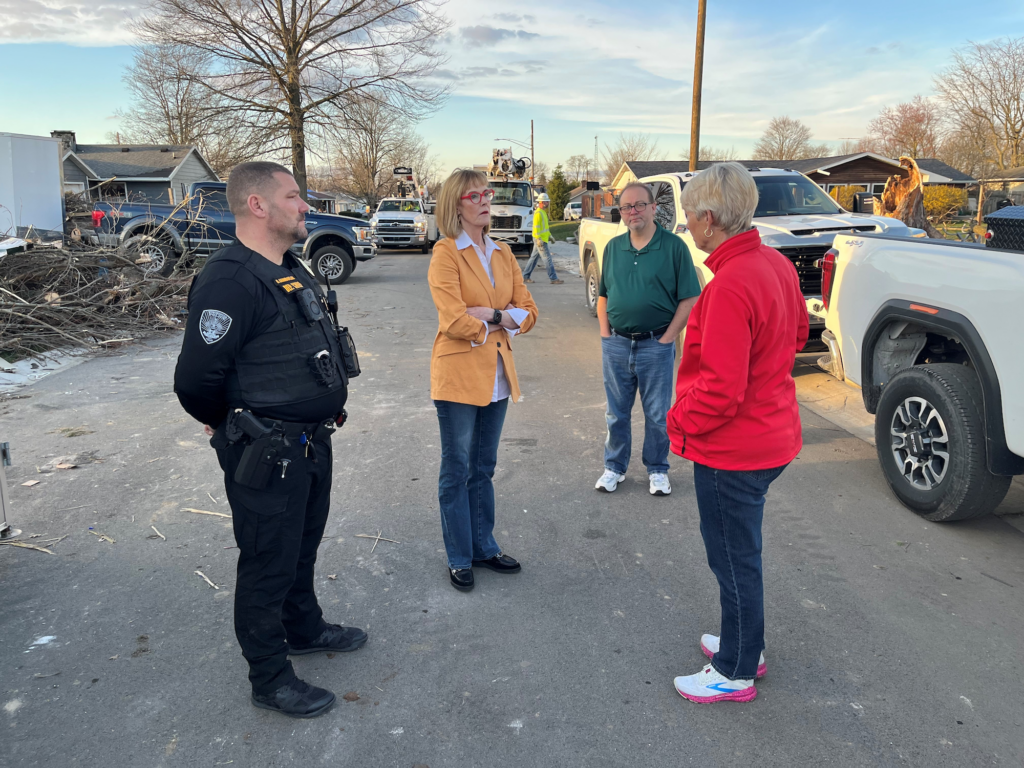
“Remember, no party has controlled the governor’s office for more than 20 years, so we need a different kind of candidate,” she said. “People are not going to respond to the same old same old.”
If Crouch wins, she would be poised to be the first female governor in Indiana in more than 200 years. Indiana Democrats are expected to nominate former Republican school superintendent Jennifer McCormick.
“I believe what’s going to happen is we’re going to attract voters to me because I’m different,” Crouch said, joking she’s the only candidate wearing red-framed eyeglasses. She added emphatically, “Because I have experience. Because I’m authentic and people can identify with me. When I’m out, people come up to me and say, ‘You know, you’re a real person.’”
A gubernatorial race, Crouch said, is “a little different” from a senatorial race or congressional race. “It’s more about likability,” she explained. “It’s more about what type of person people trust. Are you that type of person that people see leading us forward into the future? And improving their lives? It’s what you can do for them. As a candidate, it’s important to draw upon the experience I have. A candidate has to have the experience; they have to demonstrate to the people they have the experience to lead them forward; they have accomplished things that have made life better for them. It’s about relationships.
“I would argue that no one has the relationships that I have,” she said.
About Crouch
- Age: 72
- Hometown: Evansville, Indiana
- Education: Bachelor of arts, with a major in political science, from Purdue University
- Family: Married to Larry Downs with one grown daughter, Courtney
- Job: 52nd lieutenant governor of Indiana since 2017
- Work history: 56th state auditor of Indiana from Jan. 2, 2014, to Jan. 9, 2017; member of the Indiana House of Representatives from the 78th district from Oct. 16, 2005, to Jan. 1, 2014
Read this related story
- Eric Doden is running from behind but hopes his ‘bold vision’ will propel him forward
- Mike Braun on why he wants to be in politics ‘at a level of significance’
- Who is Jamie Reitenour? Indianapolis mom mobilized volunteers to make governor’s ballot
- Brad Chambers sells himself as ‘business guy’ to lead Indiana
- Bringing back barnstorming: Curtis Hill and his run for governor
Brian Howey is senior writer and columnist for Howey Politics Indiana/State Affairs. Find Howey on Facebook and X @hwypol.
Know the most important news affecting Indiana
Get our free weekly newsletter that covers government, policy and politics that impact your everyday life—in 5 minutes or less.
4 things to know about Braun’s property tax proposal
Sen. Mike Braun, the Republican candidate for Indiana’s governor, released a plan for overhauling property taxes Friday morning that would impact millions of Hoosiers, Indiana schools and local governments. “Nothing is more important than ensuring Hoosiers can afford to live in their homes without being overburdened by rising property taxes driven by rapid inflation in …
Bureau of Motor Vehicles looks to add new rules to Indiana’s driving test
The Bureau of Motor Vehicles wants to amend Indiana’s driving skills test, putting “existing practice” into administrative rule. Indiana already fails drivers who speed, disobey traffic signals and don’t wear a seatbelt, among other violations. Yet the BMV is looking to make the state’s driving skills test more stringent. A proposed rule amendment looks to …
In Indianapolis, Harris says she’s fighting for America’s future
Vice President Kamala Harris, the presumptive Democratic presidential nominee, told a gathering of women of color in Indianapolis on Wednesday that she is fighting for America’s future. She contrasted her vision with another — one she said is “focused on the past.” “Across our nation, we are witnessing a full-on assault on hard-fought, hard-won freedoms …
Indiana Black Legislative Caucus endorses Harris, pledges future support
The Indiana Black Legislative Caucus unanimously voted Wednesday to endorse Vice President Kamala Harris’ presidential run and will look at ways to assist her candidacy, the caucus chair, state Rep. Earl Harris Jr., D-East Chicago, told State Affairs. The caucus is made up of 14 members of the Indiana General Assembly, all of whom are …
